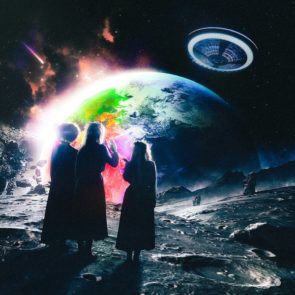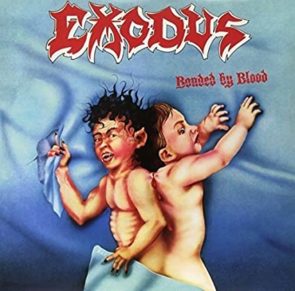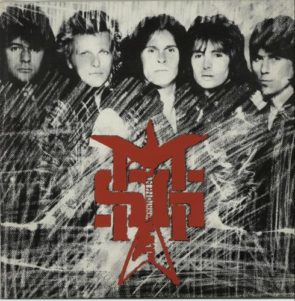
Imagine there’s a wall, right in front of you. It has always been there. You can’t walk or see through it. Other people pass through easily. The wall only exists for you.
My wall is hip hop. The condition amusia stops people from enjoying music. I may have selective amusia for hip hop. It’s not that I dislike it or find it annoying; my brain doesn’t recognise it as music. Listening to Lil Uzi Vert’s much-hyped Eternal Atake felt like reading Egyptian hieroglyphics and seeing birds and snakes and ears of grain: I have understanding, but it’s of the wrong sort and won’t let me decode the language. I have ample exposure to hip-hop: I’ve been listening to it unwillingly through car windows and gym PAs and TV shows for nearly thirty years. I should get it by now, and the fact that I still don’t makes me feel disabled.
I don’t have opinions on this album, I have questions, many of them stupid.
1) What’s the appeal of listening to someone else brag about owning things? Rap aficionados always defend this as rags-to-riches storytelling, but most rap isn’t about striving to be rich, it’s about simply being rich. The first song (and the second, and the third) reduces to”I drive a cool car”. So what? Where’s the struggle? Uzi could have gotten that Mercedes-Benz from his dad, for all I know.
2) Why do all rappers now have “Lil” in their name? My understanding is that the ubiquitous rap cognomen was once “Big” (Big Daddy Kane, the Notorious BIG, Big Boi) and now it’s “Little” (Lil Yachty, Lil Peep, Lil Peep). When did this shift occur? Is Biggie Smalls the transitional fossil?
3) Why are so many of these “Lil” rappers actually…not Lil? Lil Yachty is 1.8m tall. Lil Peep was 1.85 m tall. Lil Uzi Vert is just 1.63m, but he’s built like an NPC bodybuilder. Are they “Lil” in the sense of being young and hungry? What will they do when they turn 40 or 50? Don’t they think they’ll live that long?
4) Should these albums come with a glossary for idiot white people? At one point Uzi says “Man, she asked for some racks” and I thought his girlfriend was asking for breast implants in the weirdest way possible. Actually, a rack is a thousand dollars.
5) Why are the most memorable parts of rap always borrowed from things that aren’t rap? The “hit” of Eternal Atake is “That Way”, which samples the vocal hook of “I Want it That Way”. I won’t say Uzi just steals the chorus of a Backstreet Boys song – he interpolates it in a fairly creative way – but it’s still not exactly is. Samples can enhance a song, but when the only interesting thing about a song is its samples, shouldn’t you just listen to the original track?
6) Is this what growing old feels like? The years becoming a slow-acting acid that melts away my eyes and ears and nose, gradually destroying any connection to current culture? Locking me inside my head, until all I can do is look inwards? The older I become, the more I remember the past. And the more time I spend in the present, the less time it spends in me.

Like many classic metal albums, Bonded by Blood‘s legend is bigger than the album itself. The shadow of Exodus’s debut looms massively down the years, and the modern listener might be surprised – even disappointed – by the smallness of the album that cast it.
Exodus (along with Overkill) is often cited as “true” thrash metal, back from the days when men were men and FUCKIN’ POSERS MAAAAN hadn’t invaded the scene with their mainstream influences and melodies and coherent songwriting et cetera. Thrash metal can be awesome, but it can also be snobbish and insular, and strangely proud of its own smallness. In 1990 Exodus released a cassette entitled “Four Albums And Still No Ballad”. Is that a thing worth bragging about? Particularly when you couldn’t write an interesting ballad if your life depended on it?
Released in 1985, Bonded by Blood was actually recorded in August 1984 under the title A Lesson in Violence. The album was famously delayed for nearly a year through circumstances such as label shenanigans and a totally inappropriate cover designed by a hippie friend of guitarist Gary Holt (although that same guy also designed the Exodus logo, so maybe hippies are more brutal than is commonly believed). While the album languished, the Bay Area was flooded by bootleg recordings of the album. One wonders if Holt ever bragged to Lars Ulrich that he was fighting music piracy before it was cool.
Bonded by Blood is about riffs. It has no time for anything that’s not a riff. It demonstrated Gary Holt’s prowess as a rhythm guitarist, almost to the expense of the rest of the music. It’s the canonical example of thrash metal songwriting, where you get your best guitarist to improvise riffs for an hour, takes the five best ones, and presto, that’s a song. There’s just not a lot of thought given to anything that doesn’t have six strings.
The title track features a bruising yet intricate main riff, reminiscent of THAT part in “Fight Fire with Fire”, where even when you think you understand what’s happening on the fretboard you probably don’t. But chorus is boring and shapeless, with the guitars and drums and vocals all doing three different things. The band themselves seem to think “Bonded by Blood”‘s chorus is underwhelming: when they re-recorded the song with Rob Dukes in 2012 they added a bunch of extra drum fills to try and make it more interesting. The exact same problem occurs over and over.
The band doesn’t really “get” songwriting. They repeat vocal patterns from song to song (“Bonded by Blood” has the same verse as “Exodus”), Tom Hunting ride the same punk rock d-beat for half the album, and when they hit paydirt with a certified classic like “Strike of the Beast” and “A Lesson in Violence”, it seems almost accidental. The riffs are amazing, but they need to be. They’ll all the album has.
Paul Baloff sings on this album. It was the only studio LP he recorded in his life, and it made him a legend. I wish he lived up to the hype.
He sings like a drunk man pisses, squealing and yelping and cackling and generally flinging his voice all around the place. Maybe he’s not Darkwing Duck, but his voice has a definite cartoon character quality. You know when the villain sings his “I am evil” song? That’s Baloff. He’s hilarious and sounds like he’s having the time of his life, but the album would be much better with an actual performance on it.
So the vocals aren’t so hot, and the recorded-in-the-toilet quality vocals do Baloff no favors. Even the album’s best cuts rely on speed and power to overwhelm their shortcomings, and the bad songs could literally be modern pizza thrash shit if they were 10-15% stupider.
Forget 1985, what was happening in 1984?
Slayer’s transcendental heaviness on “Chemical Warfare”. Metal Church and Metallica’s sophistication. Bathory and Celtic Frost stepping outside the confines of thrash entirely and forging a new, blackened path. Next to those bands and albums and moments, Bonded by Blood is well-executed but a little stunted: a 40 minute exposition of Gary Holt’s right hand. The Bay Area sound was already burning itself out, and incorporating new sonic influences out of sheer necessity. Baloff was wrong, and the posers were right: thrash metal ultimately had to evolve or die.
I enjoy many parts of Bonded by Blood, but the popular perception of it as a paragon of metalness that we’ve all strayed from seems a little wrong. This is a powerful but limited album in a powerful but limited style. Where do you go from here, now that you’ve stretched Bay Area thrash to its limits? What does Bonded by Blood 2, 3, 4 etc sound like? How many times can you bang your head against the stage?

One sign you that you had overbearing egotist parents is that you have “Junior” after your name. Maybe a similar rule applies to rock bands that are titled “[Frontman’s Name] Group”.
Michael Schenker is known for his guitar skills, as well as his turbulent personality. He’s fortunate that he had most of his crack-ups in the days before social media: otherwise he’d be the heavy metal Kanye West: 30% musician, 70% source of amusement.
We’re talking stints in rehab, near homelessness, hunger strikes, feuds with with singers and producers and journalists and his own brother, cancelled tours, and a long list of other bizarre behavior.
Wikipedia advises me that forty-one musicians have played in Michael Schenker Group and have since quit or been fired. Schenker would probably fire himself from his own solo project, were such a thing were possible.
But he’s definitely brilliant. I listened to power metal for years, and one thing I’d always heard was that the style’s guitar playing owes a lot to Schenker. This is correct. There’s a straight line between most of what Schenker plays on this album and Helloween, and in the case of “On and On” – with its harmonized bends and cod-Bach synthesizer lines – it’s not even a line, it’s a dot.
This is one of the best-produced 80s albums I’ve heard, particularly the deep, thudding character of the drums. MSG has a real sense of precision and space in its mix, with everything built on top of each other like layers on a cake. It’s like you can throw a fishing line into the album and find where the vox are, where the guitars are, where the drums are, etc. Listening to MSG is a seriously good time before you even appreciate the notes.
“Ready to Rock” is an okay-ish cock rock anthem. “Attack of the Mad Axeman” seems like more of the same…but then Schenker pulls a drag-chute on the song and turns it into something adventurous and fascinating. His shredding over the final 32 or so bars…you are listening to power metal, at least five years before. Seriously revolutionary stuff.
“On and On” continues down this path, trading ethereal keys for smoldering wah pedal soloing. I’m struggling to think of more hard rock/heavy metal from 1981 that sounds like this. The Michael Schenker Group was an odd band: they didn’t sound out of place on MTV, but on a compositional level they had a quality that nobody else really possessed. Some quality of uncaring naffness and unfocused coolness.
“Let Sleeping Dogs Lie” and “I Want More” are forgettable. “Never Trust a Stranger” is the power ballad, and sounds like Elton John covered by Aerosmith. “Looking for Love” is a burning and agitated uptempo track with some great hooks and guitar moments. The final track is pretty good too, except for when the music drops away and they let Gary Bardem sing unaccompanied. He’s one of those guys who sounds great, but only if he’s located somewhere in a pile of 200 watt Marshall stacks.



